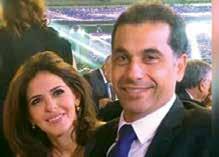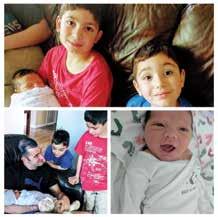
4 minute read
The Play
Open dress rehearsal at The Basma and Zeitouneh roof
When Milia Ayache ’05 returned to Beirut after finishing graduate school, she found herself back at IC talking to her old drama teacher, Riad Chirazi. The two had hit it off instantly since the day when Ayache, still in Middle school then, lied about her age and class to get into Chirazi’s theatre club reserved for seniors only. Now, she had a proposal: to take IB students to Russia and to take part in workshops at the prestigious Moscow Art Theatre. She had, herself, spent a semester there as part of her Master’s Theatre program at Harvard University. Ayache could make the necessary contacts.
In 2015, the first eight IC students travelled to Moscow. It has since become a yearly event.
Soon after the inaugural trip, her attention was drawn to the Lebanese theatrical scene. She was approached by the Masrah Ensemble, a Beirut-based theatre company, to participate in a double bill production of both a children’s play, “Ti-Jean and His Brothers,” and an adult play, “Family Stories”, which centers around post-war Serbian children.
“They were two shows that have this thread connecting them,” said Ayache. “Of leaving home, growing up. Being a child. Not being a child.”
The deal was that the actors from “Family Stories” train the children of the “Ti-Jean” production. It was the children which attracted Ayache the most. They were poor Syrian refugees residing in the Shatila camp.
And thus came her first trip to the Shatila camp – the scene of a gruesome massacre in 1982 and a maze of narrow, pollution-ridden streets, overbuilt with graying and decaying buildings and home to an estimated 20,000 Palestinian refugees. Waves of Syrian refugees, beginning in 2011, have significantly increased the camp’s population.
This is the world into which Ayache stepped. It was, to say the least, a fairly miserable world.
Ayache and her follow actors headed to the Basmeh and Zeitooneh center, an NGO which had opened a school for Syrian children. Seven youngsters, aged 11 to 14, were selected. The caged roof of the center was to be their rehearsal room.
Over the din of the camp, actors and students struggled to make themselves heard. It soon became a routine. In the morning, they would rehearse in the camps with the teenage actors, and, in the afternoon, the adult actors would rush across town to rehearse their own play.
Each adult actor was assigned two young charges. Ayache was mentor to Ali,12, and Imane, 14.
“It is through these exercises that we got to know them well,” said Ayache.
Ali, for one, had a gangly appearance and was the subject of many jokes among his peers. Despite the family’s desperate need for Ali to work after school, his mother wanted him to be part of this play.
Imane was Ayache’s Arabic language coach and Ayache adopted her northern Syrian dialect for her character in the adult play. With both parents sick, it was Imane’s responsibility to cook and clean for her many siblings.
Ayache knew that participating in the play was probably the youngsters’ last act of childhood.
The children’s stories are very much like those of other refugees. Once they had a home, a life. Now, they have nothing. Future: unclear.
Behind-the-scenes personnel were recruited from the camp – even a cook who provided meals to the entire cast.
Alaa Mohamed, 25, came on board as the show’s production manager. He, himself, was a Syrian refugee and loved theatre. He quickly became an older brother figure who kept the cast in fits of laughter.
Rehearsals continued despite occasional shootouts in the camp. Finally, it was May. Adults and students were ready. They had been rehearsing, on and off, for the past eight months. Five performances would take place in public spaces across the city.
The first two shows took place in Shatila
Photo by Jad Safar
and were a hit. The audience clapped and cheered the performers.
Thrilled with the success of the performances, Ayache rushed across town to the camp.
As soon as she walked into the center, she saw them. The children were crying. She stood staring. Finally, between sobs, they told her: Alaa died.
It seemed that he went swimming that day off the coast of Jbeil and drowned. Just like that. Alaa, their surrogate big brother, was gone.
Ayache looked at the sobbing children. It was like all the hope had gone out of them. The sobs eventually gave way to an uncomfortable silence. The pre-show meal arrived. No one budged. The heavy silence continued. The show was to be in one hour. Obviously, it had to be cancelled.
And then a small voice piped up: “My mother says the body dies but the soul never dies.”
Everyone turned to stare at the 12-yearold actor. That was a line in the play. His line actually.
Suddenly, everyone started laughing. Sobbing laughter. Nervous laughter. They slowly started looking and talking to each other. They began to eat.
Together, they decided that Alaa would have wanted them to perform. This show was to be for him. Two actors went on stage: “This show”, they told the subdued audience, “is dedicated to their friend, Alaa Mohamed.”
The performance began.
Everything went as it should.

Milia Ayache on the guitar
It was their best performance yet. A few months later, Ayache went looking for Imane and Ali to return their notebooks from their rehearsal period. Sadly, Ali had dropped out of the school and was working in a supermarket bagging groceries. Imane had transferred to another school. Her whereabouts remain unknown. To read more about Masrah Ensemble’s theatrical project Family Ti-Jean, go to: http://www.americantheatre. org/2017/02/16/playing-for-time-in-beirut/

Photo by Christine Youakim










